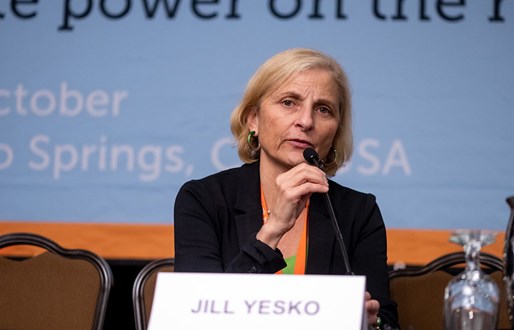Broken Trust premieres at Play the Game 2019

Jill Yesko. Photo: Yhomas Søndergaard/Play the Game
15.10.2019
By Chase Jordan Howell & Jack Carlough, journalism students from University of Colorado Boulder
“It was a privilege to see it,” said Justin Miller, an audience member and Manager of Paralympic Sports Operations for the United States Olympic Committee (USOPC). “I really enjoyed how the film had a sequence of building and demonstrating how each of the athletes had a different experience in terms of what abuse they had gone through and how there was a connection between the emotional rhetoric and how those individuals had become activists for change.”
Following the premiere, Yesko discussed her motivation for making the film. Broken Trust featured former gymnast Jessica Armstrong and former team USA speed skater, Eva Rodansky among others. Both were in attendance and shared their experiences on the panel.
“I also very much wanted to include athletes who were older, who had time to really process what had happened,” Yesko said. “I was very fortunate that Jessica and Eva were two of the initial athletes that came on board and their stories are both very strong and very compelling.”
Rodansky suffered abuse in the form of being “blackballed” by USA Speed Skating. Her complaints of a former abusive coach were ignored and led to a six-year hiatus from speed skating. Armstrong was sexually abused by a coach as a young gymnast. She was never given the platform or opportunity to reveal her story until recently, a theme among many sexual abuse victims.
The session included a question and answer session with the panel. The leader of the panel was Nancy Hogshead-Makar, who also appeared in the film, and is CEO of Champion Women, a leading activist group for women in sport. She discussed key themes such as authoritative vs. authoritarian, how sexual abuse is one symptom of a sick system, and how people often assume that prevention to abuse is common sense.
The question and answer portion led to an interesting debate on who to educate. Is it the players? The coaches? Or the higher-ups?
“I think it’s important that it’s looked at it in both lenses,” Miller said when asked which approach he prefers. “But I do think it’s important to go from a top-down approach because those individuals that are in power have influence. If leadership, either management or olympic organizations, is involved and engaged in the conversation and they understand what is happening at the lower levels if they understand those challenges then they have the power to make those decisions to reallocate funding and human resources and start making decisions to make those resources more accessible. So I do think it’s important to start there.”
Most people in the audience left with a new perspective on how to fix this ever-so important issue in the world of sport today.
“I don’t know if I would say it’s become more of an important issue for myself because I had been thinking about it quite often and how we can champion and safeguard athletes within the space that we work in,” Miller said. “I do think that something I will walk away with from this experience and from this panel is that I have a new appreciation for how broad this issue expands around the globe.”
Nikki Dryden was a competitive swimmer for team Canada in the 1992 and 1996 Olympics. She swam under Mitch Ivey, a sexually abusive coach who was banned from USA swimming in 2013. For Dryden, the problem stems from governance. Fortunately, she believes more athletes are educating themselves on these issues and growing their voice.
“I think this year is quite remarkable in the number of athletes that are here and that are educated on the issues,” said Dryden, who has been attending Play the Game for 15 years. “...It’s one thing to have athletes in the room, it’s another to have athletes who understand what are some really complicated issues around sports governance (and) is actually keeping them down.”
In more than 40 sessions, over 170 speakers will present their thoughts and oponions on a wide range of the most topical questions in world sport during the 11th Play the Game conference, taking place in Colorado Springs, USA, 13-16 October 2019.






